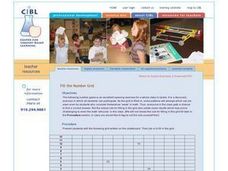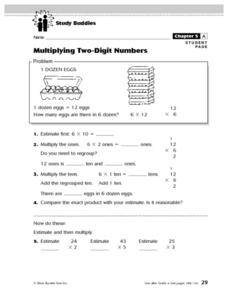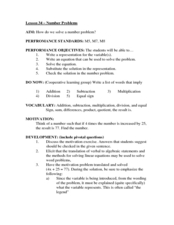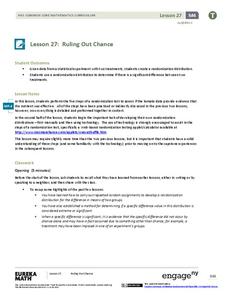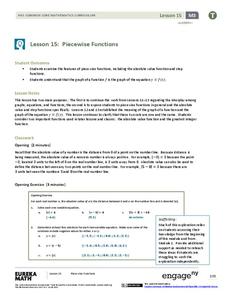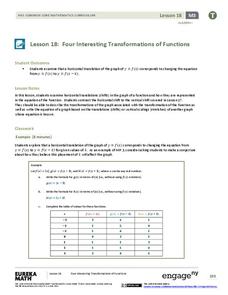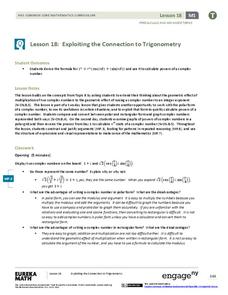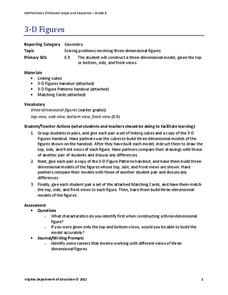Curated OER
Fill the Number Grid
Patterns emerge as the class works together to fill in a number grid. This whole group activity is designed to make all learners feel successful, and ultimately turns into a instructional activity on the least common multiple.
Curated OER
Study Buddies: Multiplying Two-Digit Numbers
For this math homework worksheet, students will solve a 2 digit multiplication problem with parental support. Students will follow a step-by-step process and "Coach's Notes" are provided for the parent helper.
Scholastic
Cracking the Code
Can you figure out the code? Learners interpret ten number patterns and write the five numbers that come next. Next, they create their own number patterns based on their own codes.
Alabama Learning Exchange
Comparing Fuel Economy
Compute fuel economy and gas mileage. Why? So you can teach rates and ratios, of course! Middle schoolers calculate the rate of miles per gallon for various vehicles. They research each vehicle, its mileage per gallon, and cost per...
Curated OER
"Polly"gon Pockets
Explore polygons with your elementary learners. Divide the class in 12 to configure the polygon puzzle before them. They list the attributes of each type of polygon they see, and if there's time, they jump on the interactive website...
Curated OER
Coco Locomotion
Technology tutees read a description about coconuts and how they are used to make biodiesel fuel. Note that the link to the article does not work, and the article does not appear to be available online. There are, if you look for one,...
Curated OER
Number Problems
Students write equations for problems. In this number lesson, students add, subtract, multiply and divide numbers to solve for a variable. They rewrite word problems using algebraic symbols.
Curated OER
Environmental Agents of Mathematics: Mathematics for Change
High schoolers analyze environmental science data using Math. They do research about renewable energy, gather data, create graphs and interpret their findings. Then the group presents their arguments persuasively using their findings to...
North Carolina State University
Shapes
Expose youngsters to 3-D objects in a hands-on learning activity involving marshmallows and toothpicks. Engage your young mathematicians by introducing them to 3-D shapes by means of a story book. Explore 3-D shapes by manipulating...
Rational Number Project
Initial Fraction Ideas: Lesson 3
Visual models support young mathematicians as they deepen their fractional number sense in this elementary math lesson plan. Using fraction circle manipulatives, children explore basic unit fractions as they develop the...
Pickle Bums
Catch a Bug Game
Young mathematicians bottle up colorful bugs as they learn to sort and count objects. With six different colored jars and six different colored bugs, children must place the creepy crawlers in their respective containers and see how many...
Math Learning Center
Grade 1 Assessments and Scoring Checklists, Common Core State Standards
Track your learners' progress in addition, subtraction, counting, and interpreting word problems with a series of assessments. The packet includes scoresheets to note learners' strengths and weaknesses as you address each skill.
EngageNY
More on Modeling Relationships with a Line
How do you create a residual plot? Work as a class and in small groups through the activity in order to learn how to build a residual plot. The activity builds upon previous learning on calculating residuals and serves as a...
EngageNY
Properties of Area
What properties does area possess? Solidify the area properties that pupils learned in previous years. Groups investigate the five properties using four problems, which then provide the basis for a class discussion.
EngageNY
The Scaling Principle for Area
As they investigate scaling figures and calculate the resulting areas, groups determine the area of similar figures. They continue to investigate the results when the vertical and horizontal scales are not equal.
EngageNY
General Pyramids and Cones and Their Cross-Sections
Are pyramids and cones similar in definition to prisms and cylinders? By examining the definitions, pupils determine that pyramids and cones are subsets of general cones. Working in groups, they continue to investigate the relationships...
EngageNY
Analyzing a Verbal Description
What function will describe the insect population growth? Pairs or small groups work together to determine which type of function and specific function will model given scenarios. The scenarios differentiate between linear,...
EngageNY
Ruling Out Chance (part 3)
Pupils analyze group data to identify significant differences. They use simulation to create their own random assignment data for comparison.
EngageNY
Piecewise Functions
Show your class members that if they can graph a linear function, they can graph an absolute value function. Groups create an absolute value graph using a table, then entertain the idea of an absolute value function defined as two...
EngageNY
Four Interesting Transformations of Functions (Part 2)
What happens to a function whose graph is translated horizontally? Groups find out as they investigate the effects of addition and subtraction within a function. This nineteenth activity in a 26-part series focuses on horizontal...
EngageNY
Interpreting the Graph of a Function
Groups sort through NASA data provided in a graphic to create a graph using uniform units and intervals. Individuals then make connections to the increasing, decreasing, and constant intervals of the graph and relate these...
EngageNY
Discovering the Geometric Effect of Complex Multiplication
Does complex number multiplication have the class spinning? Here's a resource that helps pupils explore and discover the geometric effect of multiplying complex numbers. In the 14th installment in the 32-part unit groups look at the unit...
EngageNY
Exploiting the Connection to Trigonometry 1
Class members use the powers of multiplication in the 19th installment of the 32-part unit has individuals to utilize what they know about the multiplication of complex numbers to calculate the integral powers of a complex...
Virginia Department of Education
3-D Figures
Scholars construct three-dimensional figures to study dimension and side views. Learners build models using linking cubes to match views of different sides. After practicing with models, they attempt to match three-dimensional drawings...
Other popular searches
- Grouping Math
- Math Grouping Numbers
- Math Grouping and Sorting
- Equal Grouping Math
- Math Brackets
- Math Grouping Tens
- Math Grouping Activity
- Math Grouping Worksheets
- Math Lessons Ncaa Brackets
- Grouping in Math
